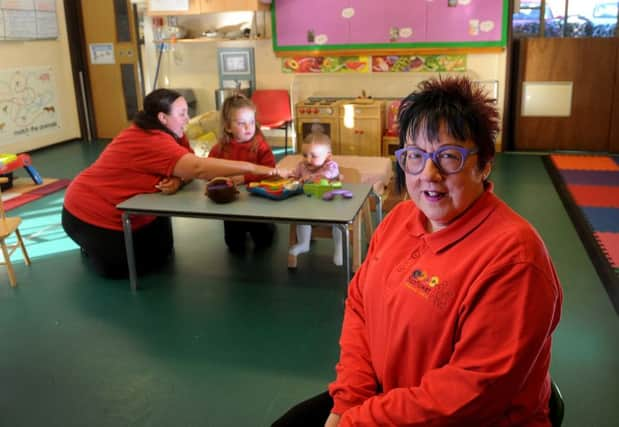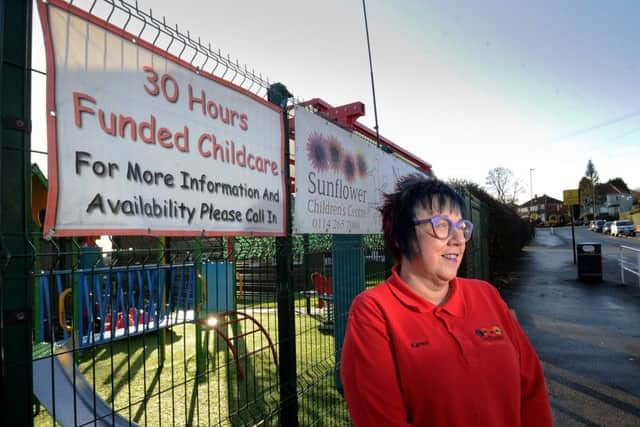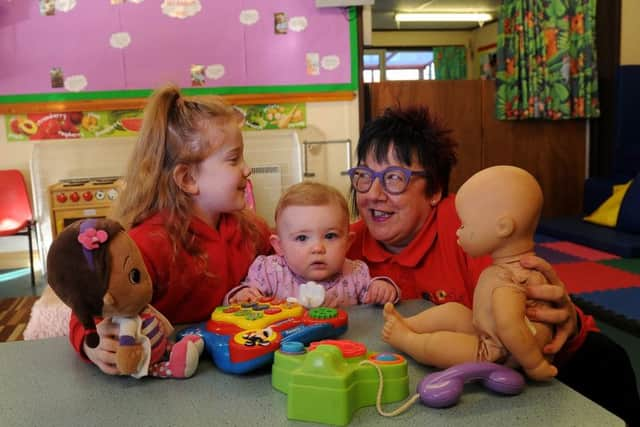Sheffield nursery owner helps expose ‘endemic’ £60m under-spending on pre-school children by councils


When the Government announced plans to double the amount of free childcare for working parents of three and four-year-olds, rising from 15 to 30 funded hours per week, Childcare Minister Sam Gyimah claimed the move would “give children the best start in life, support parents to work, and as a result, allow our country to prosper”.
It sounded inarguable in theory but since the flagship policy was rolled out across the country in September 2017, nurseries charged with delivering it argue the reality is very different as they are not being provided with sufficient funding to make it work – with the vast majority of providers getting less than £5 per child per hour and supplementary charges for parents now commonplace as funding fails to cover operational costs such as wages and business rates.
Advertisement
Hide AdAdvertisement
Hide AdAccording to figures collated by the Huddersfield-based National Day Nurseries Association charity, there has been a 153 per cent increase in nursery closures since the policy was imposed – rising from 73 in 2016/17 to 121 in 2017/18 and 185 in 2018/19 – with the majority of the closures in the most deprived parts of the country.


To date, the finger of blame has been pointed towards the Government, with the NDNA’s chief executive Purnima Tanuku saying last year that increasing closures had been “largely down to the Government not putting enough investment into this vote-winning policy for parents”.
But now the determination of a nursery owner in Sheffield has led to the discovery of an issue making things even more difficult for financially-stretched nurseries trying to accommodate the 30-hour system – councils up and down the country either holding on to millions of pounds of funding specifically provided to support this policy or even directing it to cover overspends in other areas of their education budgets.
Karen Simpkin, who has run the Sunflower Children’s Centre (which is attended by my own children) in south-east Sheffield for 18 years, had become convinced early last year that nurseries across the city were not receiving all the money they were entitled to from the council.
Advertisement
Hide AdAdvertisement
Hide Ad“Whenever they were sharing information with you, it was all smoke and mirrors,” she says.


Simpkin, who is the chair of the Sheffield network for the NDNA and represents the charity’s members on the council’s Early Years Working Group, decided to begin her own investigation after finding it difficult to get answers to her questions. She was far from a beginner at doing such analysis, having previously worked in managerial data entry roles for different companies, when she began combing through publicly-available records of the council’s “nursery funded early learning indicative budget”. The records allowed her to compare how much individual nurseries were entitled to for each child from the council against what they were actually receiving, but even with her past experience the task took considerable time.
“I could see something was happening but I couldn’t work out where the difference was going. At the time, I wasn’t sure what question to ask. I found the data and started to go through it. It took me about two months because I was doing my own job as well.”
After checking her findings with both her own accountant and the NDNA’s, Simpkin realised there was an £800,000 underspend in the 2018/19 budget. Sheffield Council subsequently announced it would increase the basic rate paid to nurseries from £4.10 to £4.14, with the ‘deprivation supplement’ increased from 10p to 40p per child and both rises backdated to April 2019. In October, the council released a statement saying the increase was a result of “collective work” but added that “we are glad that we were able to work closely alongside Karen to resolve this situation”.
Advertisement
Hide AdAdvertisement
Hide AdSimpkin says: “If I am honest they did make me feel like I was stupid on many occasions. But I’m quite tenacious and thought I know I am right.”
Following Simpkin’s investigation in Sheffield she believed council underspending was likely to be repeated across the country – and the NDNA decided to see if she was right. The organisation submitted Freedom of Information requests to all local education authorities in England, receiving responses from 130 of them.
They found over £63.5m had gone unspent across the country, while £26m had been directed towards contingency budgets. Fifteen LEAs had underspends of more than £1m, including £5.1m in Surrey and £2.6m in Birmingham.
The 12 councils in Yorkshire and Humber which responded had a combined underspend of £5.4m, with the highest being Leeds with £1.8m, followed by Bradford with £730,000 and Kirklees with £678,000. Despite its increase in rates, Sheffield Council’s underspend stood at £500,000 and the authority said it is working with providers on how best to use the money.
Advertisement
Hide AdAdvertisement
Hide AdAlthough underspends can be carried over into the next financial year, not every council is doing this. The FoI responses from Kirklees, Doncaster and North East Lincolnshire all admitted that at least part of their underspends had been used to offset deficits in other parts of their education budget. The NDNA said nationally 10 LEAs had redirected £8.6m towards overspending in their High Needs Block covering children and young adults up to the age of 25. Simpkin says of the national picture: “If I’m completely honest I wasn’t even the slightest bit surprised. I knew if Sheffield had an almost £1m underspend, it would be endemic.”
But she adds the council underspending is a smaller part of a wider problem. “The amount of money the Government is giving to the sector and then calling it ‘free childcare’ is disrespectful. Right at the beginning, it should have been called a contribution to the fees of parents because that is all it is. It has been extremely difficult, we have to charge parents and the fight to get parents to understand why is hard.
“The Government aren’t funding it properly but the council underspends are making a difficult situation even more difficult. It would only improve things slightly but it is what has been allocated to us and we should have it.”
That assessment is shared by Helen Gration, who owns four nurseries in Leeds and York and is an NDNA trustee for Yorkshire. She says the concerns of providers who piloted the 30-hours policy before it was rolled out nationally went seemingly ignored.
Advertisement
Hide AdAdvertisement
Hide Ad“York was one of the pilot areas for the system and we were feeding back to the Department for Education that this can’t be done as a ‘free’ rate. Childcare is expensive in this country because it is isn’t funded like other countries. That is not the fault of childcare providers.”
She says dealing with the new policy has happened alongside increases in pension contributions and business rates, as well as rises in the minimum wage - which will go up again this April.
“Every nursery is going to gave a six per cent pay rise for every member of staff. Childcare now is an education, it is not babysitting. The majority of our staff are qualified to a degree level and above and our early years teachers. We want to retain good staff but we have lost staff recently to charity and scientific research jobs.”
She says the council underspending is not the central problem for providers.
Advertisement
Hide AdAdvertisement
Hide Ad“If you divide the £1.8m in Leeds between every eligible child in the local authority area, you are probably only talking about a few hundred pounds. The problem with the funding is that it was undervalued right from the very start.
“Good quality early years education is actually a cost saver in the long-term because those children are much better prepared for school and their outcomes are much better.”
Purnima Tanuku, Chief Executive of NDNA, says what has been uncovered is deeply concerning.
“Our analysis shows an alarming discrepancy in the way that early years funding for three and four-year-olds is being used and how much is not reaching providers across the country.
Advertisement
Hide AdAdvertisement
Hide Ad“We have unravelled the true scale of the disastrous funding system which, if not addressed urgently by the Department for Education, will create a further crisis within early years.
“Contingencies have a role to play due to fluctuations in take up. But we have seen large scale contingencies that go unspent which must be challenged as they take funding away from the frontline.
“The government announced it is investing £3.6bn to support its funded places in 2020/21 but it appears that a significant proportion of that will not reach the actual providers. Our figures of £63.5m underspent and contingency budgets of £26m are likely to be much higher because 21 councils did not submit their responses at all.
“We know that council budgets are stretched to capacity, especially around High Needs and SEND support - but this robbing Peter to pay Paul approach is recklessly short-sighted. It damages the quality of care children and families receive.
Advertisement
Hide AdAdvertisement
Hide Ad“Early years has been chronically underfunded for years now, and yet this is the place where investment in education can make the biggest difference. Due to government policy, nurseries and other providers have had to absorb rising costs, especially 6 per cent increases in minimum wages and inflated business rates, while their funding rates have stagnated or been reduced. It’s no wonder that more nurseries are forced to close their doors and qualified staff are leaving the sector to work in supermarkets for better pay and conditions
“We call on the Minister Nick Gibb and Chancellor to act ahead of the Budget - not with any more sticking plasters, but with a meaningful overhaul of the funding system which ensures nurseries are not penalised for delivering funded early education on behalf of the government.”
Government defends funding record
The Government has said underspending issues are related to incorrect council projections.
A Department for Education spokesperson said: “The Government recently announced an increase in our hourly funding rates for councils so that they can continue to deliver high quality and free childcare places. In total, this government is now planning to spend more than £3.6bn in 2020/21 to support these offers. The setting of local provider funding rates is a decision for local authorities in consultation with their Schools Forum. The free childcare offers for two, three and four-year-olds are demand-led and local authorities will see an underspend in their funding if take-up of any of the entitlements has not been as high as the authority had forecast.”
Advertisement
Hide AdAdvertisement
Hide AdMeanwhile, Sheffield Council has said while it is working to increase provision to the city’s nurseries, the national funding it receives isn’t sufficient.
Abtisam Mohamed, cabinet member for education and skills at Sheffield City Council said: “Karen Simpkin is a valuable member of our early years working group which is made up of people from early years, private, voluntary, independent, community and school sectors. We work closely with the working group to review the current early years funding arrangements and discuss how the national funding allocation impacts on resources locally.
“Last year an update was provided to this group that confirmed there would be an additional £500,000 to invest in early years. Additional funding for early years has meant that we have increased the hourly rate for three and four year olds to £4.14 for the second year running, as well provide a further increase for nurseries, schools and childminders who are working with the most socially deprived children in the city.
“However, we recognise that the funding received isn’t enough. The national funding formula means Sheffield receives significantly less funding for three and four year olds, than other cities of a similar size and characteristic. We continue to work closely with schools, nurseries and childminders to raise our concerns about the national funding formula and plan to make a representation to the Ministers and the Government to make sure our children get a fair deal.
Advertisement
Hide AdAdvertisement
Hide Ad“In the spending round last year, the Chancellor did however announce an extra £66m nationally to increase the hourly rate paid to childcare providers. At our Sheffield School Forum meeting next week we will put forward a proposal to further increase funding rates (from April 2020 onwards) for two year olds and three and four-year olds.”